Having the opportunity to be a research assistant in Dr. Jong-Hyun Son’s lab was such an impactful and educational experience. My research is focused on determining the long-term effects of hypoxia induced neurotoxicity on the dopaminergic neurons and swimming behavior of juvenile and adult zebrafish. Furthermore, the significance of this research is that these physiological paradigms, such as lack of oxygen to the brain, can be associated with the development of neurogenerative and neurodevelopmental disorders in human species. By participating in experimental analysis, scientific knowledge is increased, medical advances are made, and better assessment technology is invented. It is rewarding to know that this research is helping to further understand the precursors to and effects of disorders such as Alzheimer’s and Autism.
The most rewarding part of this internship was being able to carry out a research experiment from start to finish and fully understanding the mechanisms behind it. The first stage of my internship allowed me to understand the responsibility and importance of maintaining the zebrafish colony. This task included following a feeding schedule, balancing water pH, and cleaning the tanks and filters. I learned to never underestimate the simplistic activities and responsibilities of the research process. The second stage of my internship was completing the behavioral trials, which consisted of placing each zebrafish in a swimming arena for a 20-minute duration, 10 minutes in a light environment and 10 minutes in a dark environment. The velocity, total distance traveled, and the amount of time spent moving and not moving were measured using a motion-detection camera. The third stage of my internship was to analyze the data on the cellular and molecular level by performing CLARITY and immunohistochemistry. This staining protocol allows for the dopaminergic neurons to be visible under fluorescent light, which helps us to compare the brain development and neuronal spatial distribution of the two different treatment groups, normoxia and hypoxia. Moreover, the most challenging part of my internship was the unpredictability that comes with performing research. There are times the experiment did not go the way I expected, so I then had to rerun the trials or statistics to find the inconsistency or error. Research is a humbling experience because it requires patience and determination to reevaluate the procedure and make the proper modifications. Each time, I learn something new, and it helps me to process the information from a different lens.
Having the opportunity to connect this research to my role as a future physician has truly enhanced my perspective on how to carry out the scientific method when diagnosing and treating a patient. This internship has not only increased my critical thinking, communication skills, and lab techniques, but it has also given me the confidence, leadership, and endurance needed to be successful in medical school. As a physician and diagnostician, I will be educating other medical professionals and patients, performing research, and taking part in medical breakthroughs and advancements. My passion is to change the lives of others by finding ways to improve their course of treatment and prevent other diseases from developing. This opportunity has brought me one step closer to accomplishing my goal of becoming a neurosurgeon. At this moment, I am gaining more knowledge about the nervous system through research, but one day I will be using these techniques and understanding to operate on the brain of an individual.
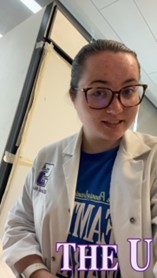
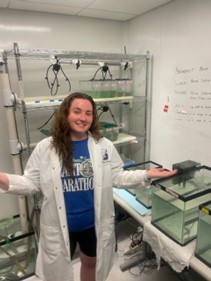
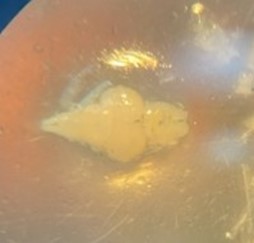
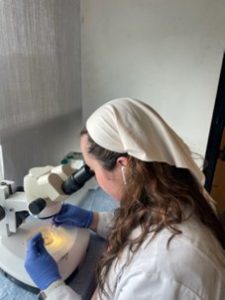
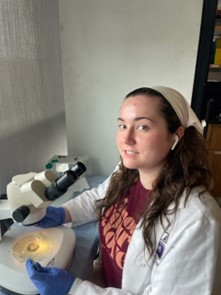
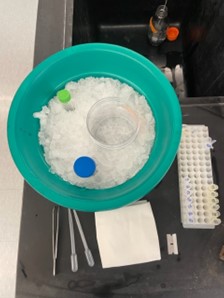
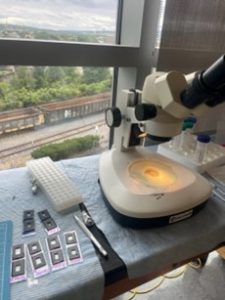
Olivia Manarchuck, Neuroscience ’24
Hi Olivia! Just by reading this blog, I believe the experience you gained from interning at Dr. Jong-Hyun Son’s lab will be very beneficial for your future. This experience sounded like it was very hands-on, and you got to learn almost everything by doing it. I am glad this was a good experience for you, and I hope this helps you excel in this field in the future!
Hey Olivia! I am so happy that you got to get some good experience from working in Dr. Jong-Hyun Son’s lab for the summer. I remember from the first blog post that you were so excited to get into the lab and look at these effects of hypoxia. Your passion is clearly shown, and it is so influential to see someone that clearly is dedicated to their research. It really inspired me to look deeper into what I want to pursue for my next research project.
Hi Olivia!
It is amazing that the experiences and professional skills you have learned while conducting research will help prepare you for your future in medical school. I enjoyed reading about your research and I love your pictures! Good luck as you follow your dreams of becoming a neurosurgeon!
Hi Olivia! It was amazing to hear about your hands-on experience you had this summer! Like you said, it is awesome to be able to complete something all on your own from start to finish. The research opportunities that the University provides for students is awesome to get their toes in the water and explore the field they want to be in. Good luck with everything and I hope that your dream comes true about becoming a surgeon!
Hi Olivia,
This is a fascinating area of research. It’s so interesting that the effect on zebrafish can be transferred to the human species. It’s critical that as researchers we understand why we research and the bigger effect of researching, which you seem to understand. The format of the research project sounds very interesting and the skills learned will stick with you as you progress through academia. It’s great that you are able to look forward to your future and how beneficial this experience was.